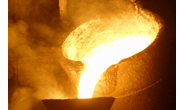Product

February 24, 2022
Some U.S. Steelmakers Shielded from Fallout from Russia-Ukraine War
Written by Michael Cowden
Some North American flat-rolled steelmakers were silent when asked what the impact of the conflict between the U.S. and Russia might be on their operations. Others said their supply lines weren’t in the crossfire.
One reason for the silence in some corners: Many rely heavily either on Russian slab or Russian or Ukrainian pig iron to make steel sheet and plate.
![]() “We do not expect the conflict to have an adverse impact on our steelmaking operations,” a spokeswoman for Charlotte, N.C.-based Nucor – North America’s largest steelmaker – said in an email to SMU.
“We do not expect the conflict to have an adverse impact on our steelmaking operations,” a spokeswoman for Charlotte, N.C.-based Nucor – North America’s largest steelmaker – said in an email to SMU.
Pig iron has accounted for approximately 10% of Nucor’s ferrous material consumption in recent years, most of which was sourced from Ukraine and Russia in 2021, she said.
The issue of pig iron availability is critical because electric-arc furnace (EAF) steelmakers rely heavily on such virgin iron units to make more demanding products such as hot-rolled coil.
Nucor regularly shifts its mix between prime scrap, pig iron, hot-briquetted iron (HBI) and direct-reduced iron (DRI) depending on pricing and availability. The company also has captive sources of DRI thanks to facilities in Trinidad and in Louisiana. In addition, it has a broad group of suppliers able to offset any individual shortfalls, the spokeswoman said.
“Our steelmaking operations are flexible enough to accommodate a wide range of ferrous materials as inputs,” she said. “Should the availability of pig iron from eastern Europe be curtailed for any length of time, we are confident that we can replace this material with alternatives.”
Cliffs isn’t directly exposed either, a company spokeswoman said. That’s because the Cleveland-based steelmaker is self-sufficient in iron ore pellets and does not import either slabs or pig iron. It also operates an HBI plant in Toledo, Ohio, and has access to prime scrap thanks to its acquisition of scrap recycler Ferrous Processing and Trading (FPT).
“Our vertical integration is the surest way for us to secure our long-term competitive advantage and more control over our manufacturing inputs,” the spokeswoman said.
“This is especially critical in times like this when other steel producers must rely on more unpredictable and unreliable raw material sourcing strategies,” she added.
The Ukraine-Russia conflict matters to steel because much of the fighting is over Ukraine’s industrial heartland – the equivalent of a battle in the U.S. taking place in Michigan and on the Mesabi Iron Range in Minnesota, Cliffs Chairman, President and CEO Lourenco Goncalves noted during a fireside chat at the Tampa Steel Conference earlier this month.
That means mills won’t be able to leverage imported pig iron as they had in the past to keep a lid on prime scrap prices.
Pittsburgh-based U.S. Steel, meanwhile, said its operations were running normally. “We have not had any issues with raw material deliveries to date, but we have been taking prudential actions for some time to mitigate any potential issues, should they occur,” a company spokeswoman said.
ArcelorMittal – one of the world’s largest steelmakers – declined to comment on whether its North American operations would be impacted by the conflict. It confirmed that its operations in Ukraine already had been affected.
“Our priority is our people, and we had developed plans to help them stay safe should the situation escalate in this way,” an ArcelorMittal spokeswoman said.
“As far as our plant is concerned, our team is working to slow down production to a technical minimum, and production will be stopped at our underground mines. We all hope for a swift resolution,” she said.
ArcelorMittal Kryvyi Rih is Urkaine’s largest integrated steelmaker, per the company’s website. Its operations include not only a blast furnace, steelmaking and rolling facilities but also a coke plant and an iron-ore mine.
In North America, ArcelorMittal’s primary flat-rolled operations are in Mexico, in Canada at ArcelorMittal Dofasco in Hamilton, Ontario, and in Alabama at its AMNS Calvert joint venture with Japan’s Nippon Steel.
Other mills contacted by SMU declined to comment or did not respond to requests for comment.
The conflict also matters to steel because Russia is among the largest foreign steel suppliers to the U.S., especially when it comes to semifinished steel slabs. Ukraine is an important supplier of pipe and tube products.
The U.S. imported 1.47 million metric tonnes of steel from Russia in 2021, making it the sixth largest supplier of foreign steel to the domestic market, according to Commerce Department figures. The bulk of that steel, 1.29 million tonnes, was semifinished products, a category that includes slabs.
The U.S. imported 130,636 tonnes of steel from Ukraine last year. Almost all of it, 113,101 tonnes, was pipe and tube, per Commerce figures.
By Michael Cowden, Michael@SteelMarketUpdate.com







